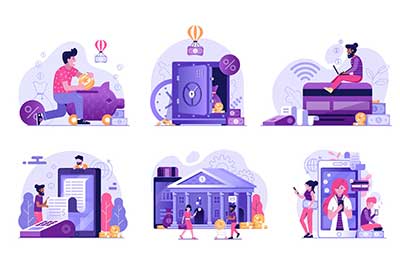Date: 20/10/2022
Relevance: GS-3: Indian Economy and issues relating to planning, mobilization of resources, growth, development and employment. Inclusive growth and issues arising from it.
Key Phrases: Digital Banking Units, Digital Financial Literacy Centres, Specialised Fixed-Point Business Units/Hubs, Ease Of Living For The Common Citizens, Financial Inclusion
Why in News?
- The Finance Minister has recently announced the setting up of 75 Digital Banking Units (DBUs) in 75 districts to commemorate 75 years of India's independence from British rule.
What are Digital Banking Units (DBUs)?
- DBUs are specialized branches for delivering paperless, digital banking products and services and act as digital financial literacy centres
- They are specialised fixed-point business units/hubs housing minimum digital infrastructure for delivering digital banking products and services.
- This will be delivered in both self-service and assisted modes.
Why are DBUs being introduced?
- The main objective is to improve the availability of digital infrastructure for banking services which will help accelerate and widen the reach of digital banking services.
- DBUs would be for digital banking like PCOs (in the late nineties) were for long-distance calling or Internet cafés for browsing.
- This setting up of DBUs is another important step in the country’s banking industry journey, from being physical to phygital to digital-first to digital only.
- In fact, NITI Aayog has pitched for “digital only” banks to be set up in the country.
How does having DBUs help customers?
- This will give customers cost-effective/convenient access and enhanced digital experience of products and services in an efficient, paperless, secured, and connected environment, with most services being available all year round.
- The DBUs will enable those who do not have ICT infrastructure to access banking services digitally.
- They will also assist those who are not tech savvy to adopt digital banking.
- In DBU, the products and services will be offered to customers in 2
modes:
- Self Service Mode
- Digital Assistance Mode
How many DBUs are going to function in India?
- 75 DBUs in 75 districts have taken off which are part of the pilot programme and would be expanded based on the experience.
- As of now, each of the 29 States and eight Union Territories has got at least one DBU.
- Karnataka, Odisha, Rajasthan, Tamil Nadu and Uttar Pradesh have got four each, the maximum number of DBUs in a State.
What services and products can banks offer in a DBU?
- Each DBU must offer certain minimum digital banking products and self-service fulfilment services.
- However, banks have the freedom to offer any other product or service in addition to the minimum bouquet to cater to the specific needs of the service area.
- Any product or service that can be provided digitally through internet banking or mobile banking can be provided in the DBU.
- There shall be adequate digital mechanisms to offer real-time assistance and redress customer grievances arising from business and services provided by the DBUs directly or through Business Facilitators/ Correspondents.
Which are the services that can be availed in the DBU?
- Both liability side products and services and asset products and services have to be provided at a DBU.
- On the liability side, the products and services include
- Account opening: Saving bank account under various schemes, current account, fixed deposit, and recurring deposit account;
- Digital kit for customers: Mobile banking, internet banking, debit card, credit card, and mass transit system cards;
- Digital kit for merchants: UPI QR code, BHIM Aadhaar, POS, etc.
- On the asset products and services side, banks should offer
- Making applications for and onboarding customers for identified retail, MSME, or schematic loans. This may also include end-to-end digital processing of such loans, from online application to disbursal;
- Identified Government sponsored schemes covered under the National Portal.
Who can set up DBUs in India?
- All domestic scheduled commercial banks other than regional rural banks, payments banks, and local area banks can set up DBUs.
DBUs will be different from traditional branches in following aspects:
- DBUs will provide banking services including cash deposit & withdrawal 24 x 7.
- Services shall be provided digitally.
- People not having connectivity or computing devices can do banking transactions from DBU in a paperless mode.
- Bank staff will be available to help and guide users for banking transactions in assisted mode
- They will help in providing digital financial literacy and create awareness for adopting digital banking.
Difference between Digital Banking and DBUs:
- Balance Sheet/Legal Personality:
- DBUs DO NOT have legal personality and ARE NOT licensed under Banking Regulation Act, 1949 (u/ B R Act).
- Legally, they are equivalent to “banking outlets” i.e., branches.
- Digital Banks will have a balance sheet and legal personality & are proposed to be duly licensed banks u/ B R Act.
- Level of Innovation/Competition:
- DBUs improve existing channel architecture by offering regulatory recognition to digital channel. However, they are silent on competition.
- The DBU guidelines expressly state that only existing commercial banks may establish DBUs.
- In contrast, a licensing and regulatory framework for Digital banks as proposed here, is more enabling along competition/innovation dimensions.
Conclusion:
- DBU is a big step in the direction of Ease of Living for the common citizens.
- DBUs will enable customers to have cost-effective, convenient access and enhanced digital experience of banking products and services throughout the year.
- They will spread Digital Financial Literacy and special emphasis will be given to customer education on cybersecurity awareness and safeguards.
- The DBUs will go a long way in giving further and faster digital banking in India and help our economy to move towards a cashless and inclusive economy.
Source: The Hindu BL
Mains Question:
Q. What are Digital Banking Units (DBUs)? How DBUs are different from traditional banking branches and Digital Banking? How they can help our economy to move towards a cashless and inclusive economy.






















